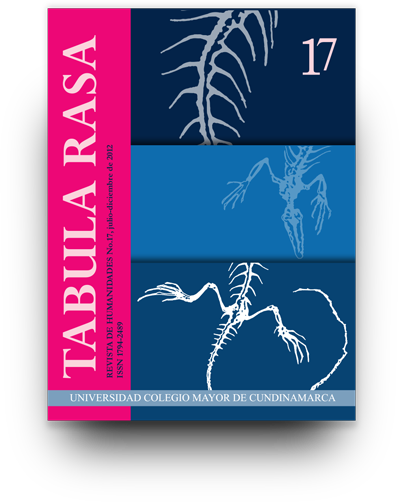Horizons of ethnographic reflection. Insights and strains for anthropological studies in Chile
Horizontes de la reflexividad etnográfica. Revelaciones y tensiones para el estudio antropológico del desarrollo en Chile
Show authors biography
An ethnographic approach to private economic sector in a country like Chile could appear obvious for anthropological work. In fact, this is the country that served as a laboratory for designing and testing neoliberal theses, which are the ones critically and massively blamed to “govern world”. Likewise, it is likely to confirm that this model deployment trascended from economic-political matrices up to the country’s daily life itself, where social classes continue to show deep breaches and imbalances. Notwithstanding with all this, we ethnographers in Chile have sheepishly and slowly moved forward to addressing neoliberal common sense. Such a delay can be explained on its own, that is what this lecture deals with. As a core thesis, we are discussing the conditions and qualities of anthropology as a science that have traditionally been on the side of minorities, and the eventual traps such a standing might pose to the discipline’s growth. As an empirical point of reference, we are encompassing ethnographic approaches to forest industry and its sociocultural circumstances, as a result of the reflection preceding and accompanying the execution of Fondecyt N°11080196 Project, between November 2008 and November 2010.
Article visits 66 | PDF visits 35
Downloads
Aguirre Baztán, A. 2004. La cultura de las organizaciones. Barcelona, Ariel.
Alonso, L. 2009. Prácticas económicas y economía de las prácticas. Crítica del posmodernismo liberal. Madrid, La Catarata.
Álvarez, L. 2007. «Visión histórico-sistemática de la antropología social». En: Lisón Tolosana, C. (editor). Introducción a la antropología social y cultural. Teoría, método y práctica, pp. 23-52. Madrid, Akal.
Arce, A. & N. Long. 1992. “The dynamics of knowledge. Interfaces between bureaucrats and peasants”. En: Long & Long (eds.). Battlefields of knowledge. The interlocking of theory and practice in social research and development, pp. 211-246. Londres, Routledge.
Carrasco, N. 2010. Trayectoria de las relaciones entre empresas forestales y comunidades mapuche en Chile. Aportes para la reconstrucción etnográfica del desarrollo económico en contextos interétnicos. (Presentado para ser publicado, en proceso de evaluación de pares).
Escobar, A. 1995. Encountering Development: The Making and Un-making of the Third World. Princeton, Princeton University Press.
Eyben, Rosalind. 2000. “Development and Anthropology: A view from Inside the Agency”. Critique of Anthropology, Vol. 20 (1): 7-14.
Funtowicz, Silvio y Jerome Ravetz. 2001. La ciencia posnormal. Ciencia con la gente. Barcelona, Icaria.
Greenwood, D. 1996. «Antropología de los negocios». En: Prat y Martínez (eds.), Ensayos de antropología cultural. Homenaje a Claudio Esteva-Fabregat, pp. 270-277. Barcelona, Ariel.
Menéndez, Eduardo. 2002. «El malestar actual de la antropología o de la casi imposibilidad de pensar lo ideológico». Revista de Antropología Social, núm. 11, 39-87.
Marcus, G. 1995. “Ethnography in/of the World System. The emergence of multi-sited ethnography”. Annual Review of Anthropology, Núm. 24, pp. 95-117.
Nash, June. 1981. “Ethnographic aspect of the world capitalist system”. Annual Review of Anthropology, 10: 393-423.
Pacheco de Oliveira, J. 2006. «Plurarizando tradiciones etnográficas: sobre un cierto malestar en la antropología». En: Pacheco de Oliveira (comp.). Hacia una antropología del indigenismo, 201-218. Rio de Janeiro, Contra Capa.
Ribeiro, Gustavo Lins. 1985. «Proyectos de gran escala: hacia un marco conceptual para el análisis de una forma de producción temporaria». En: Leopoldo J. Bartolomé, (comp.), Relocalizados: antropología social de las poblaciones desplazadas. Ediciones del IDES, N° 3, pp. 49-66, Buenos Aires.
Roca i Girona, J. 1998. Antropología industrial y de la empresa. Barcelona, Ariel
Roca i Girona, J. 2001. ¿Antropólogos en la empresa?: A propósito de la (mal) llamada cultura de la empresa. Revista Etnográfica, Vol. V (1), pp. 69-99. Disponible en: http://ceas.iscte.pt/ etnografica/docs/vol_05/N1/Vol_v_N1_69-100.pdf (consultado en mayo de 2009).
Rosas, A. 1993. «Hacia una antropología de la globalización». En la serie Reportes de Antropología de la UAM-Iztapalapa, núm. 6, abril.




